Peter Kyle MP defends Rachel Reeves amid a fresh scandal about the …
GBN
Labour’s bombshell budget has yielded no growth and sparked an exodus of investment from Britain
Don't Miss
Most Read
Trending on GB News
Chancellor Reeves is scrambling to raise taxes and cut spending after her bombshell budget failed to spark growth and eliminated her fiscal headroom.
The Labour Chancellor’s massive package of tax rises, many of which have been labelled as ‘ideologically driven’ on account of the paltry sums they raise, has spooked markets, crashed business confidence and driven investment away from Britain.
The result is that the UK economy grew by 0.1 per cent in the last quarter, a real terms cut to Britons’ standard of living as population increase negated any tangible benefits of this tiny growth figure.
The worsening economic picture means Reeves will be scrambling to look at new ways to raise money or cut spending and get the UK’s finances back on track.
One option is to reform ISAs, a cash saving mechanism brought in by Gordon Brown to make Britain a ‘nation of savers’.
Currently, people choose to invest in ISAs as they offer a safe investment and steady (if small) returns via interest rates which, crucially, are tax free.
The relief is only available for interest earnings on up to £20,000 in the ISA. This means if you invested £20,000 in an ISA with a 4.5 per cent interest rate, you would earn £890 a year tax free.
Tax relief on ISA earnings are thought to cost the government £6billion a year on lost tax receipts, making it a prime target for a fresh Reeves’ raid.
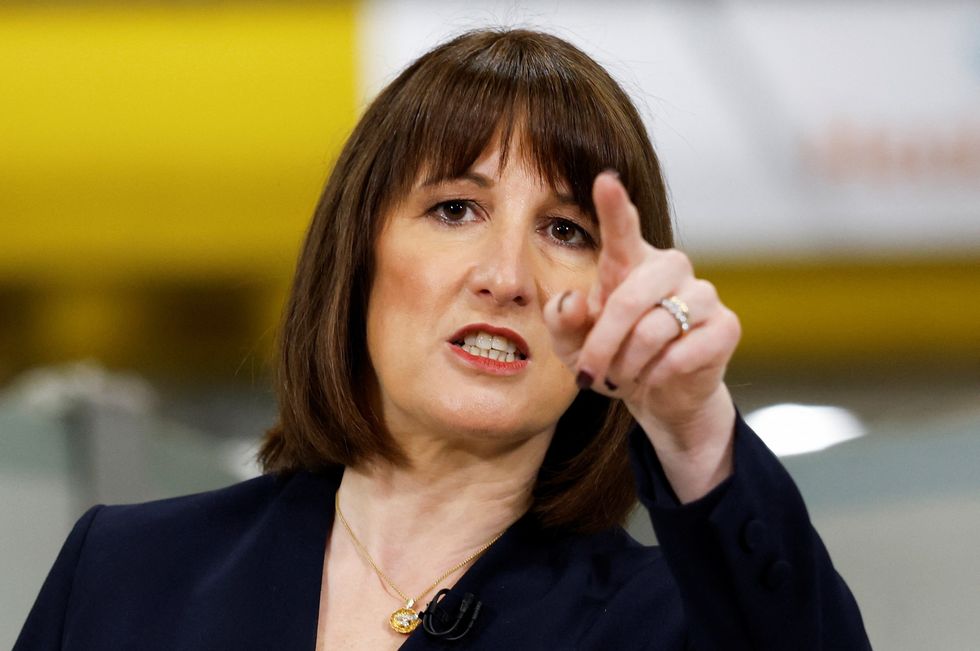
Reeves is currently battling accusations she exaggerated her career on her Linkedin profile
PAAnother key factor at play is the fact a huge £300 billion is tied up in these ISAs, a lot of which isn't being spent or taxed and therefore in Reeves’ eyes not of use to the government.
By slashing tax relief on ISA earnings and therefore making them less attractive to invest in, Reeves hopes to unlock much of this £300billion as people spend their money or move it into riskier, but potentially more lucrative, stocks and shares.
One way Reeves could do this is by subjecting ISA earnings to income tax, thus reducing the amount you earn significantly.
GB News has crunched the data and generated the following table showing how much your Isa would earn you and how much that earning would be reduced depending on your income tax band.
It reveals for people with £20,000 in a typical ‘easy access’ Isa yielding 2.69 per cent in interest (market average), you would lose £107 a year if you were in the basic income tax band.
That rises to £215 a year lost to the Treasury if you are in the higher income tax band (40 per cent).
If you have a more lucrative Isa with a return of 4.45 per cent (as offered by HSBC), your earning of £890 a year from interest would be slashed by £178 if you are in the lower tax bracket and £356 if you are in the higher band.
Examples of tax free Isa earnings in the UK if you had £20,000 in the Isa
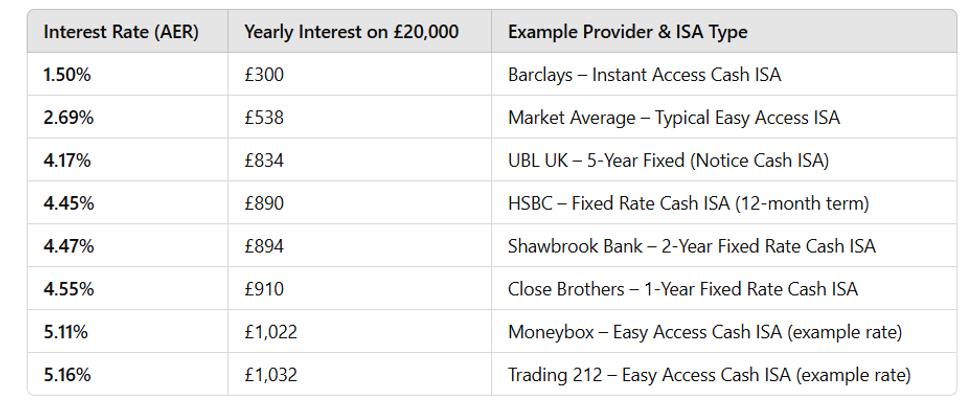
Examples of tax free Isa earnings in the UK if you had £20,000 in the Isa
GBN
How much you could lose if Isa earnings were subject to income tax, broken down via interest rate and tax bracket
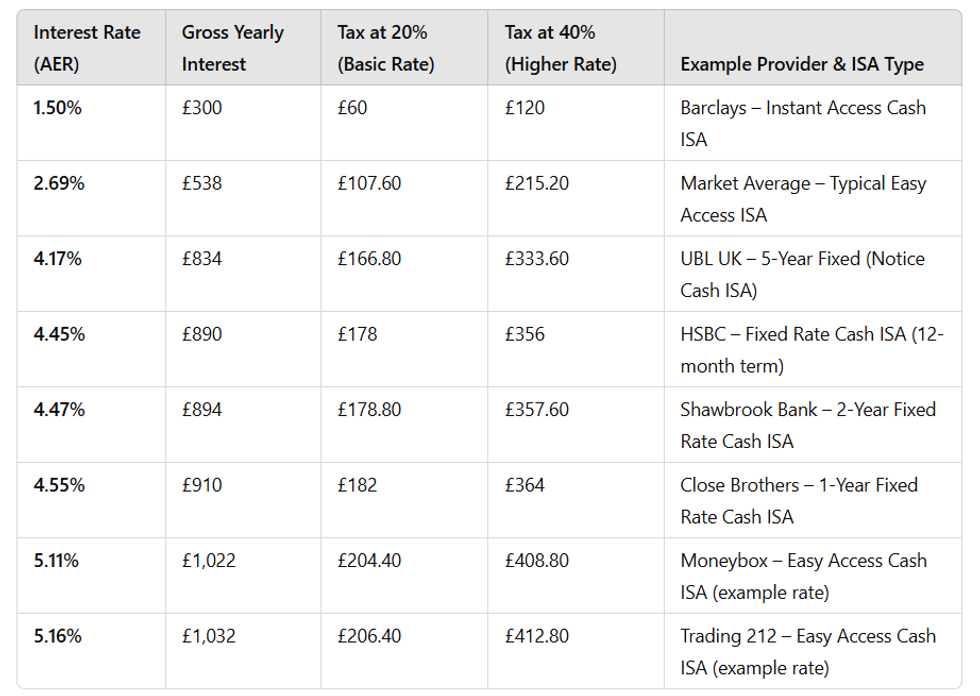
How much you could lose if Isa earnings were subject to income tax, broken down via interest rate and tax bracket
GBN
How much you could lose if Isa earnings were subject to income tax, broken down via interest rate and tax bracket
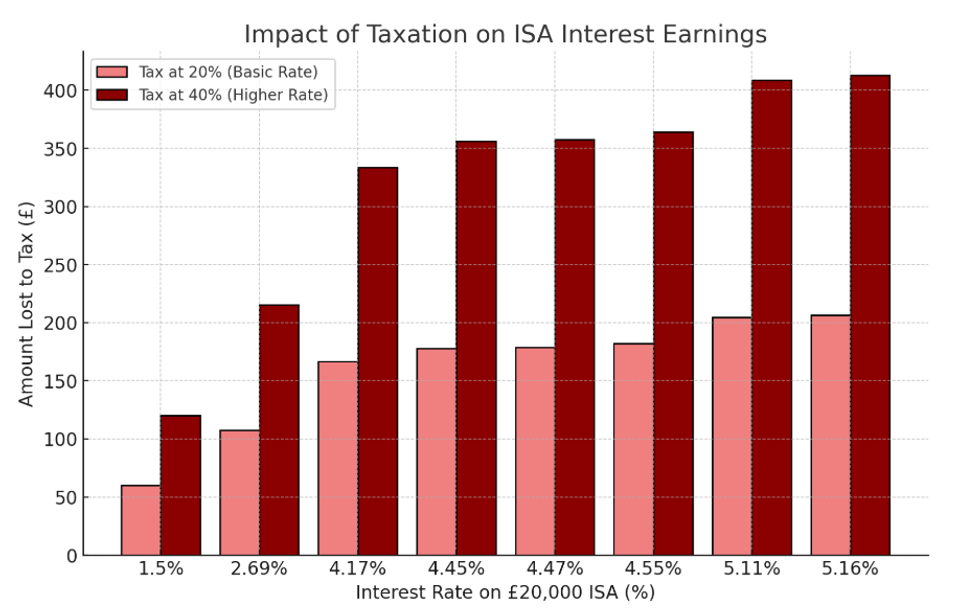
How much you could lose if Isa earnings were subject to income tax, broken down via interest rate and tax bracket
GBN
Critics have warned the move may affect older people disproportionately as they prefer safe and steady investments like ISAs.
There is also the risk of people reinvesting in riskier investments and losing money, not to mention the argument people should be free to do what they want with their own hard-earned cash.
It comes after Labour has been accused of enacting an ideologically driven, punitive budget policies that raise little money but hit people who don’t typically vote Labour like pensioners, farmers and parents who use private schools.
Slashing the winter fuel payment for nine million pensioners has drawn heavy criticism for its relatively small saving of £1.4 billion, less than the amount Labour has said it will invest into HMRC for additional compliance officers.
Another widely slammed policy has been to subject farmers to death duties, a policy that will raise £520 million a year from 2030, which is enough to fund the NHS for a mere one day.
Critics have asked whether ripping a crucial pillar of support from under such an important industry to Britain that is facing unprecedented pressure and a mental health crisis is worth it for such a paltry sum.
LATEST FROM MEMBERSHIP:
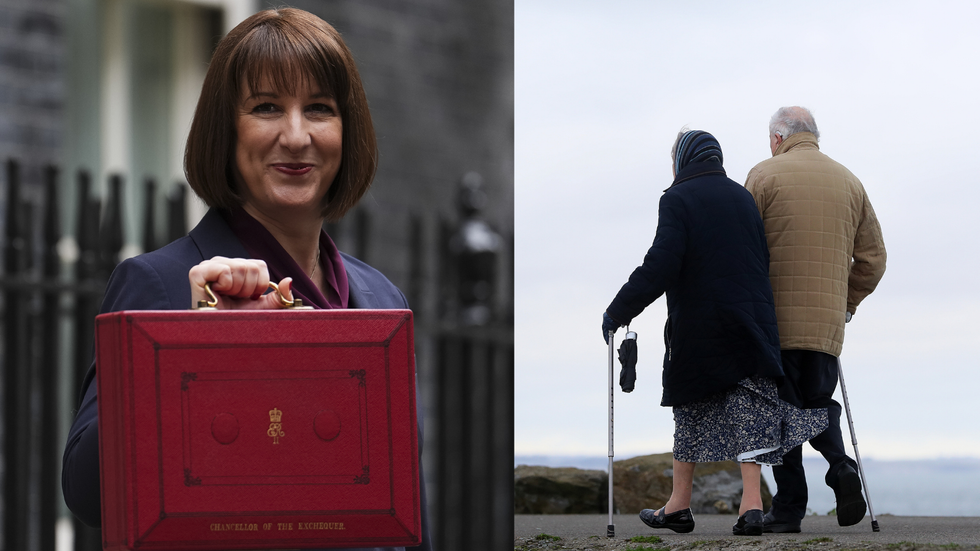 Rachel Reeves has targeted pensions and farmers with inheritance tax changesGB News
Rachel Reeves has targeted pensions and farmers with inheritance tax changesGB NewsLastly, the decision to charge private schools VAT has been labelled as an ideologically motivated attack that will penalise hard-working middle-class families choosing to spend a significant sum on their child’s education.
Like super wealthy landowners who can afford top lawyers to shield them from death duties, it is the super-rich parents who will be able to afford rising private school fees.
The £1.3 billion the Treasury will rake in from VAT receipts has also been challenged as the resulting cost of educating children in state schools who would have gone to private school has been estimated to negate any benefits.
Labour is also subjecting pensions to death tax, a move that has been labelled ‘cruel’ as it punishes sudden death and means earnings that have been invested throughout one’s life (and therefore taxed as income) are taxed again at death.
Returning to the potential ISA raid, a Treasury spokesman refused to rule it out, stating: 'We want to help people save for their future goals. We keep all aspects of savings policy under review.'







